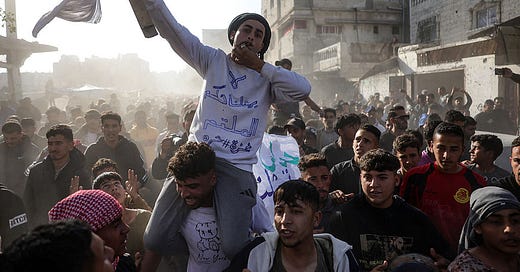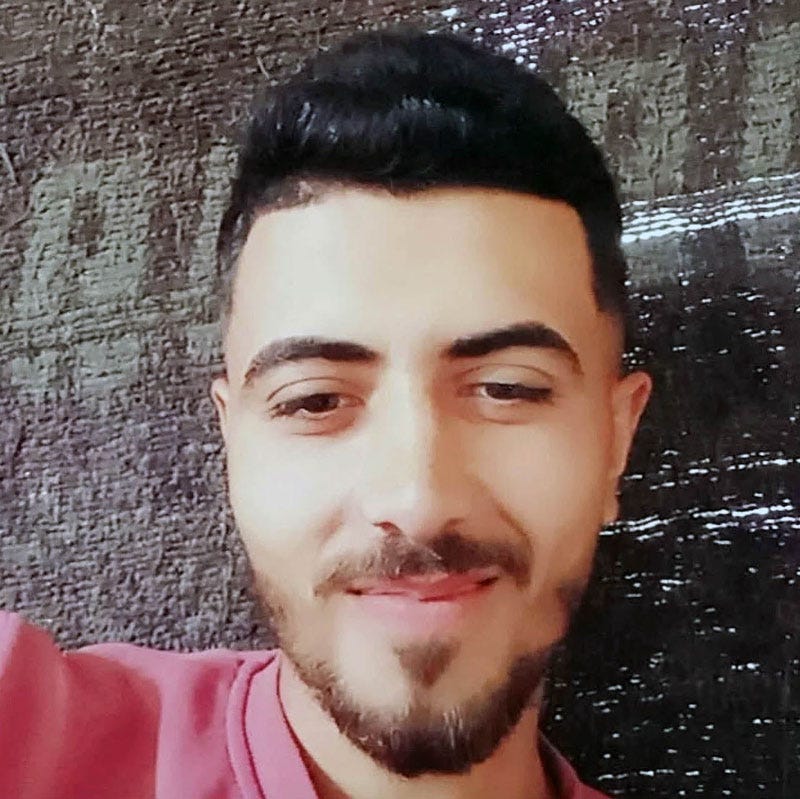
The Free Press

On March 29, in a neighborhood called Tel al-Hawa in southern Gaza City, Hamas brutally murdered 22-year-old Uday Nasser Saadi al-Rabbay, his family said. After Uday had been tortured and mutilated, his body was thrown off a tall building.
His crime? He had spoken out—loudly and publicly—against the terrorists who rule Gaza with an iron grip.
For three straight days last week, thousands of courageous Palestinians took to the streets all across the Gaza Strip in the largest anti-Hamas demonstrations since October 7, 2023. Uday was part of those protests. But on Saturday, he took a step beyond. He stood up inside a coffee shop in Gaza City, and in a loud voice, denounced Hamas.
According to his family, a few hours later, around 30 armed men from the Qassam Brigades, Hamas’s military wing, stormed his home and dragged him away. His family says they tortured him for hours, until he was dead. When they were done—after they had broken his fingers, stabbed him repeatedly, and smashed his head with a rifle butt—they dropped his body off a rooftop. A note was pinned to his clothes: “This is the price for all who criticize Hamas.”
His mother, along with his siblings, found the body.
Until now, the family has been afraid to talk to reporters, worried that their words would be twisted—as many local journalists in Gaza serve as de facto Hamas mouthpieces—or that the remaining al-Rabbay sons would be targeted next.
But through our partnership with The Center for Peace Communications, The Free Press was able to obtain exclusive interviews with Uday’s mother and father and one of his cousins. This is the first time they’ve spoken publicly about what happened.
“He was a real man. He didn’t like to beg for anything. He didn’t like what was unjust.” That was the first thing Uday’s father said in describing his son.
Uday wasn’t a militant, his father went on to explain. He was just a young man who wanted to live a normal life—and who refused to pretend Hamas hadn’t robbed him of that. Long before last week’s demonstrations, Uday was known for speaking out against the terrorist group, and he had been persecuted for it. His mother said she warned him. “Be careful,” she told her son. “You know they’ll come for you.”
“I’m not afraid,” he replied.
About a year ago, his father said, Hamas falsely accused Uday of stealing some cash and gold. They arrested him, took away his phone and all his savings, and tortured him.
“They wanted to shoot him in both legs, but he escaped through the window and came home,” his father said.
After the anti-Hamas protests erupted last week, Uday saw an opportunity to challenge Hamas again. He went to the Hamas-run police station and demanded to know if there were any charges against him. There weren’t. Then he demanded that Hamas return his phone and his money, and come to his neighborhood to issue a public apology for calling him a thief.
That never happened. Instead, they sent some 30 men to murder him.
“They caught him, tortured him, slashed his arms with knives, stabbed him with screwdrivers,” his mother said. “They stabbed him 170 times. His whole body was stabbed and pierced, and the blood was pouring out.”
Uday was one of 12 children. He had finished high school, but saw no point in pursuing college. “There’s no future in higher education,” his mother explained. “No jobs or anything. No stable work.”
Instead of burdening his father with college expenses, Uday wanted to help him support the family, his cousin said. Uday worked odd jobs when he could—stocking shelves at a supermarket, or clearing rubble, or selling firewood. He wanted to get married, too, but that dream was out of reach. “His financial situation wasn’t good,” his mother said. “Not good enough to get married.”
Most of all, he just wanted to leave. His older brother Lu’ay had already somehow managed to escape Gaza, not an easy thing to do, and landed in Belgium. Uday planned to follow him. “He told me that once the war ends, and Ramadan starts, he’ll emigrate to where Lu’ay is living,” his mother said, her voice breaking. “He wanted to get out.”
It’s the dream of many in Gaza right now. “Every young Gazan man besieged in the Gaza Strip dreams of leaving safely with all his family members,” Uday’s cousin said. “We want to live life like other people do. We want education, a future, and jobs. We want a dignified life.”
That’s what the protests were about. They were driven by young people who grew up in the ruins of Gaza, suffocating under Hamas rule, desperate to live a normal life.
Uday’s family now lives in fear. His mother said Hamas never contacted them directly after their son was killed. But threats started coming in. “They’re threatening his brothers now,” she said. “Are we going to lose all our children?”
Uday’s friends have also begun receiving threats, and some are now in hiding. Iyad Jundia, one of the leaders of the anti-Hamas protests in northern Gaza, posted a video on social media on Monday claiming the Qassam Brigades have placed his name on the “red list”—which he says is effectively a death list.
Uday’s story hasn’t made international headlines. There won’t be marches for him in Western capitals. There are no viral hashtags, or candlelight vigils, or statements from Western politicians or celebrities. But inside Gaza, people know his name.
“He stood up in a coffee shop and shouted against Hamas,” said Hadeel Oueis, the journalist who spoke with his family. “That small act made him a target. But it also made him a symbol. He was one of the few brave enough to speak up in public. And he paid the ultimate price for it.”
“People have started to speak out because of the death,” Uday’s cousin said. “One person is sitting, and suddenly there is a bombing that kills his son, father, mother, or even himself. So he says to himself, Do I die from the occupation and say nothing, or do I die while saying the truth? The people are fed up.”
Watch our exclusive interview with Uday’s family here:
For more coverage of Gazans resisting Hamas, read Tanya Lukyanova’s piece “Inside the Largest Anti-Hamas Protests in Gaza’s Recent History.”





